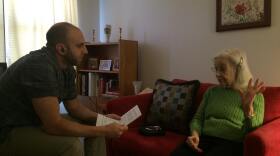A panel of federal judges heard arguments Tuesday over North Carolina’s controversial voting law at the Fourth Circuit Court of Appeals in Richmond, Virginia.
Thehearing was the latest legal step in a long saga over House Bill 589, passed nearly three years ago by state lawmakers. It was in June 2013 when the North Carolina General Assembly passed a measure that mandated photo identification, reduced early voting, and eliminated same day registration, among other provisions.
The law was challenged by a series of plaintiffs who say the measure disproportionately burdens African Americans and Latinos. A federal court judge upheld the law, ruling it doesn’t discriminate. That decision is now being appealed to the Fourth Circuit.
"There are thousands of voters on the uncontested factual record who were shut out of the political process under this bill," U.S. Department of Justice Attorney Anna Baldwin said to the three judges. "The notion that the United States and the plaintiffs failed to show this law impacted the number of voters who were able to vote – that is simply not true."
The defense maintains plaintiffs have failed to use statistical evidence to prove discrimination. A ruling from the panel could uphold or undo the controversial law.
"We had the benefit of the 2014 election and the plaintiffs have said well you can’t just rely on one election – well it’s the only election we have to rely upon," defense attorney Tom Farr said.
Part of the legal proceedings have looked at minority voter turnout data from 2010 and 2014 – the mid-term election before and after the controversial law took effect. The defense says there was no drop in minority participation. Plaintiffs have repeatedly reminded judges that the 2014 election included a contentious U.S. Senate race between then incumbent Kat Hagan and ThomTillis. They say that is a key variable that helped to drive voter turnout.
Another area of questioning Tuesday centered on intent and what motivation state lawmakers had in enacting the measure three years ago. Appellate Judge Henry Floyd offered a statement as he asked the attorneys a series of questions.
"[The] Republican Party got control of both the House, Senate and Governorship; and the opportunity came to change those pretty liberal voter registration provisions – with Shelby. And it happened the same day Shelby was decided. It looks pretty bad to me – in terms of purposeful discrimination," said Floyd, referring to the 2013 Supreme Court ruling that struck down a part of the 1965 Voting Rights Act provision and freed nine mostly Southern states from federal oversight.
The general election is 20 weeks from these proceedings, and the expectation is that the three judge panel will rule relatively quickly, so that the state Board of Elections will have enough time to prepare.
Copyright 2016 North Carolina Public Radio








